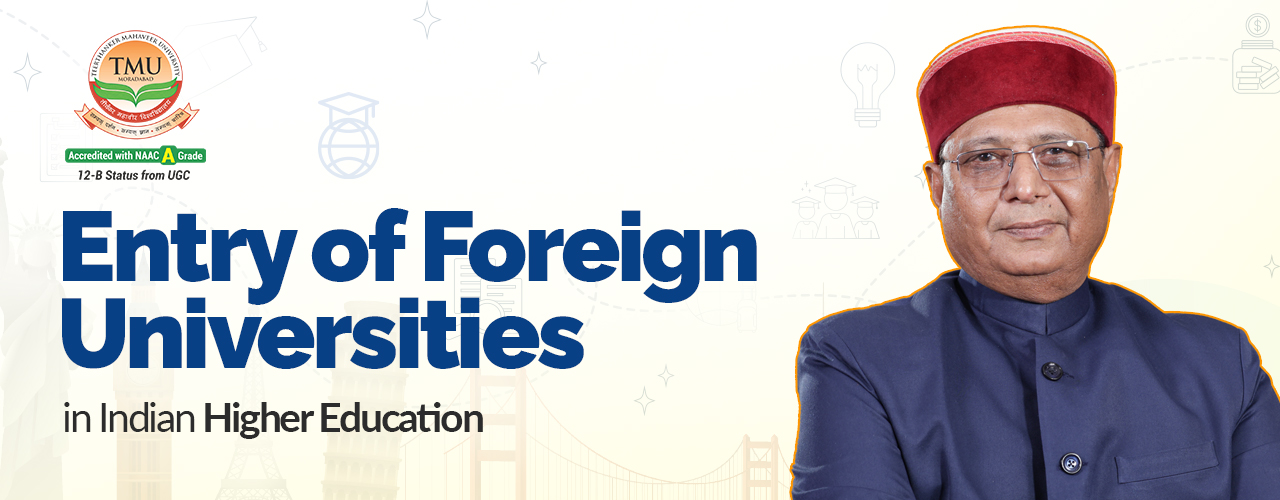Entry of Foreign Institutions in Indian Higher Education: Legal Framework and Concerns
Table of Contents
By Prof. (Dr.) Harbansh Dixit
Introduction
A legal framework is being established to facilitate the entry of foreign institutions into India's higher education sector. In this context, the University Grants Commission (UGC) has released a draft titled "University Grants Commission (Setting Up and Operation of Campuses of Foreign Higher Educational Institutions in India) Regulations, 2023".
As per the draft, foreign institutions ranked among the top 500 globally will be permitted to establish campuses in India, subject to UGC's approval. These institutions will enjoy significant autonomy, including the freedom to set admission criteria, determine fee structures, design curricula, and appoint faculty. They will also be allowed to repatriate their earnings abroad under the Foreign Exchange Management Act (FEMA), 1999.
Teerthanker Mahaveer University
Apply for Admission
Click Here To Apply for Admission
Expected Benefits and Motivations
The proposed entry of foreign institutions is expected to bring positive transformation to Indian higher education. It could inspire domestic institutions to raise their standards and foster international academic collaboration. Additionally, it may provide students with access to global-quality education without having to travel abroad, saving valuable foreign exchange.
The draft allows foreign institutions to determine their own admission processes and fee structures. This stands in contrast to domestic private institutions, which are subject to regulatory oversight and do not have the freedom to set fees independently. Monitoring bodies and courts often issue directions in the public interest to prevent commercial exploitation in education.
Education as a Service, Not a Business
In the P.A. Inamdar v. State of Maharashtra (2005) judgment, the Supreme Court clearly stated that education is not a business but a service. Accordingly, even private institutions cannot operate purely on commercial lines.
Last year, the Maharashtra government allowed a sevenfold increase in medical college fees (up to ₹24 lakh), which was subsequently struck down by the Supreme Court. The court reiterated that educational institutions cannot be turned into commercial ventures.
It is difficult to imagine that a foreign university would establish a campus in India solely for service. Profit generation is likely to be a key objective. If permitted to repatriate profits freely, it may promote a culture of commercialisation in education and create challenges for Indian institutions competing under stricter constraints.
Unequal Playing Field
Indian institutions are bound to comply with governmental and judicial directions, whereas foreign universities would face no such restrictions. This creates an uneven playing field, as domestic universities will have to compete with foreign ones enjoying far greater autonomy.
Moreover, the draft lacks clear guidelines regarding the utilisation of profits by foreign institutions. This raises the concern that funds could be diverted to non-academic purposes, further complicating regulation and oversight.
Concerns Over Curriculum and Faculty Autonomy
The draft grants foreign universities the right to determine their faculty hiring standards and curriculum content. Educational institutions are foundational to national development. Curriculum design not only imparts knowledge but also shapes the intellectual and moral development of students.
Institutions must offer direction and instil positive values. However, certain institutions may, intentionally or otherwise, influence students with specific ideological agendas. Although Indian institutions are subject to extensive oversight, the draft regulations merely state that foreign institutions must not offer curricula contrary to national interests—a vague and overly broad clause that lacks clarity.
This ambiguity demands serious consideration, and if necessary, the establishment of a regulatory body to prevent any neglect of national interest.
Social Equity and Access
Post-independence, the government emphasised education for all, particularly for the underprivileged and marginalised. Reservation policies and scholarships enabled students from disadvantaged backgrounds to rise to positions of prominence.
The UGC’s draft vaguely mentions “need-based scholarships” but does not impose any accountability on foreign institutions. They would be allowed to charge high fees from Indian citizens without any mandatory social obligations. This may lead to the deepening of inequities in higher education.
Only students from affluent backgrounds will be able to afford such education, excluding those from weaker sections. The absence of socio-economic diversity in classrooms may erode the social learning that arises from shared educational experiences.
Conclusion
Policymakers must consider these challenges carefully. While international academic collaboration is beneficial, unchecked autonomy for foreign universities may jeopardise the principles of equity, access, and national interest. A balanced, well-regulated framework is essential to ensure that the benefits of global education do not come at the cost of India's educational sovereignty and social justice.
This content gives an overview of the programme and is for educational purposes only. For updated admission guidelines and counselling support, please connect with our Counsellor Team.














